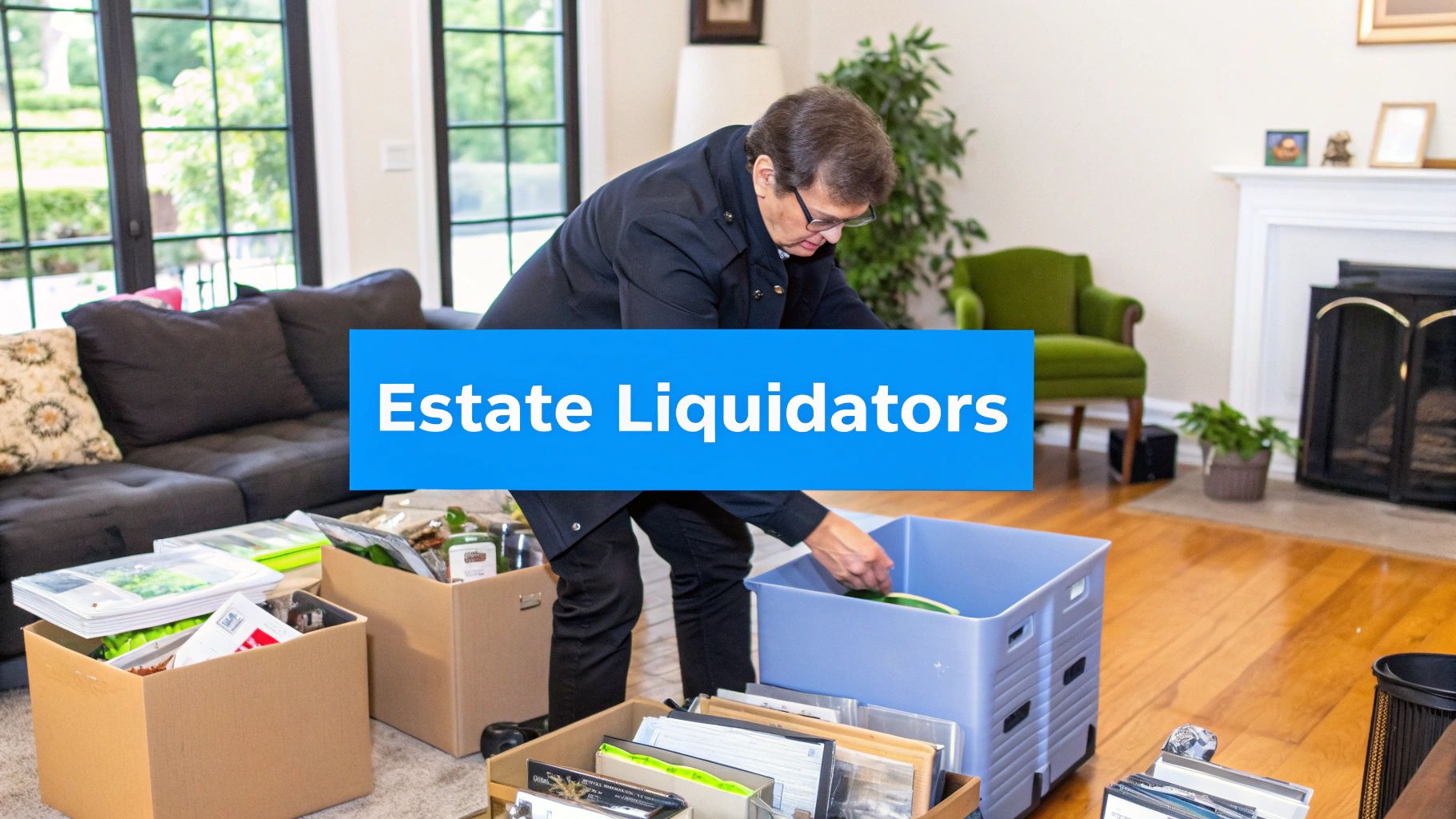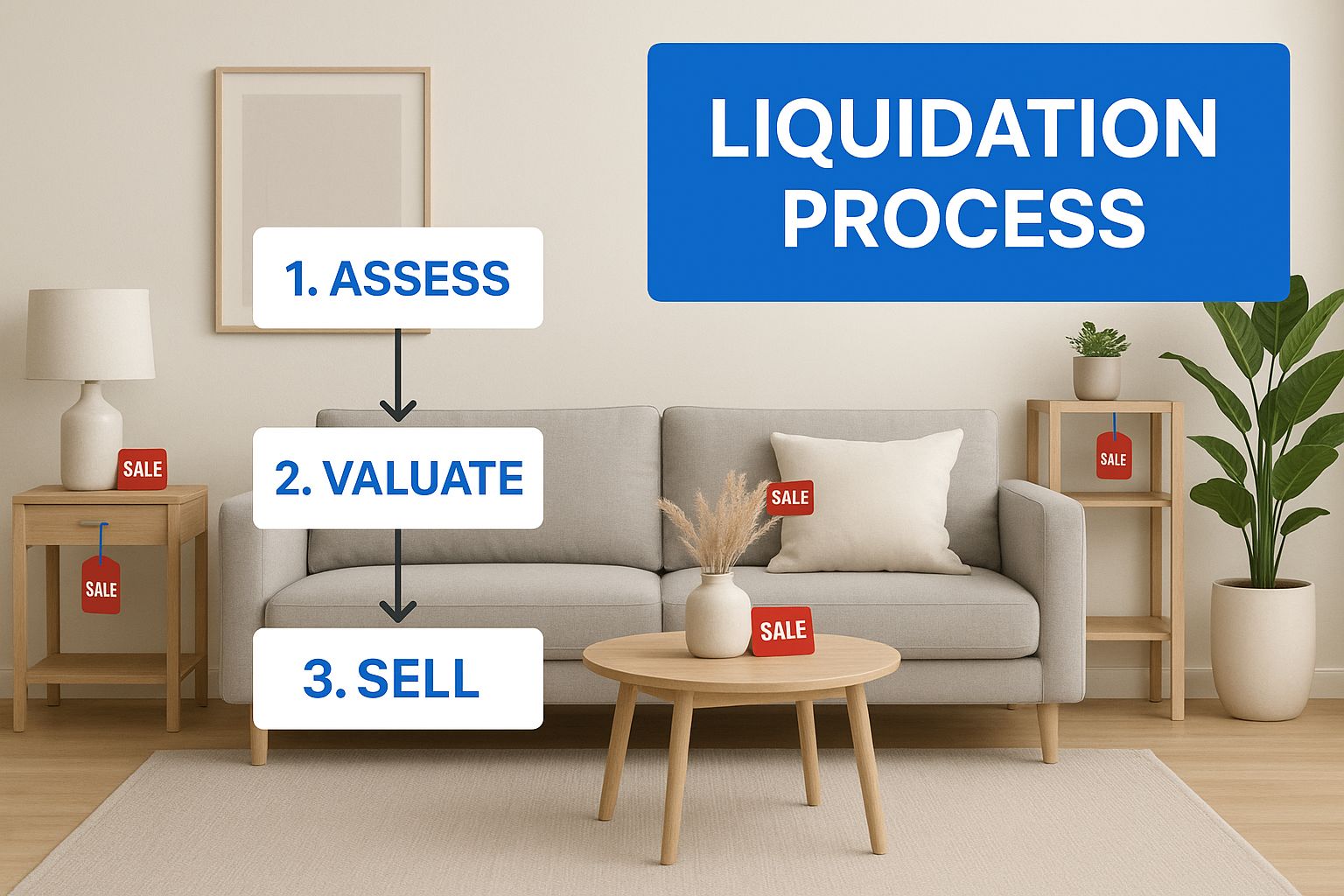Find the Right Estate Liquidation Company Today

An estate liquidation company is a professional service that steps in to manage the sale of personal property from a home. This usually happens after a major life event like a death, a big move, downsizing, or a divorce. They handle everything—from sorting and pricing to marketing and running the sale—turning a huge, complicated process into something manageable for families.
What an Estate Liquidation Company Really Does

When you're faced with clearing out an entire home filled with a lifetime of memories and possessions, the task can feel absolutely crushing. Think of an estate liquidation company as a full-service project manager for this exact situation. Their main job is to bring order to the chaos during what is often a very overwhelming time.
These companies come in to professionally manage the sale of a home's contents from start to finish. This is an invaluable service for anyone executing a will, families handling a loved one’s estate, or even someone downsizing for a move. Instead of you having to sort through every single item, they bring the expertise and manpower to get it done right.
More Than Just a Sale
A liquidation company’s job goes way beyond just sticking price tags on furniture. They are strategists, figuring out the best way to sell the items—whether that’s an on-site estate sale, an online auction, or taking high-value pieces to a consignment shop.
Their typical services include:
- Inventory and Sorting: They catalog every item in the home, from valuable antiques down to the everyday kitchen gadgets.
- Appraisal and Pricing: Using deep market knowledge and sometimes professional appraisers, they set prices that are both fair and competitive.
- Staging and Merchandising: They arrange the home’s contents to create an attractive, welcoming environment that encourages people to shop.
- Marketing and Promotion: They advertise the sale to their network of buyers, collectors, and the general public to make sure you get a great turnout.
A reputable liquidation company acts as your advocate. Their goal is to maximize the financial return from the estate while minimizing the stress and emotional toll on you and your family. Their expertise transforms a daunting clear-out into a structured, profitable event.
Solving the Toughest Challenges
The real value of a professional liquidator is their ability to solve problems. They handle all the logistical hurdles that families often find completely overwhelming. For instance, they know how to value obscure collectibles, manage crowd control during a busy sale, and process payments securely. You can learn more about the whole process by exploring what is estate liquidation in detail.
And their job isn't over when the sale ends. A key part of their service is managing the aftermath. This includes arranging for unsold items to be removed through donation, consignment, or disposal. Some companies even offer comprehensive cleanout services, leaving the property completely empty and broom-swept.
By hiring an estate liquidation company, you're not just selling stuff. You're investing in a smooth, managed process run by experts who can navigate the complexities with efficiency and compassion.
The Liquidation Process From Start to Finish
So, what does an estate liquidation company actually do? It’s one thing to understand the concept, but seeing the step-by-step process is where it all clicks. From the outside, it can look like a monumental task, but a good company has a well-oiled system.
Think of it as them taking a chaotic, emotional situation and applying a clear, predictable roadmap. Each step builds on the last, transforming a home full of memories and possessions into an organized, profitable event. Knowing what to expect makes the whole journey feel much more manageable.
This infographic breaks down the key stages in a typical estate liquidation.
 As you can see, it’s a logical flow from the initial planning all the way through to the final clean-out.
As you can see, it’s a logical flow from the initial planning all the way through to the final clean-out.
Phase 1: The Initial Consultation and Agreement
Everything starts with a simple conversation. A representative from the company will meet you at the property for a walk-through. They’re there to get a feel for the scope of the project—assessing the contents, estimating potential value, and figuring out the labor involved.
This meeting is your chance to interview them, too. Don't be shy! Ask about their experience, their marketing plan, and make sure they're insured. A true professional will be ready with transparent, straightforward answers.
After the walk-through, they’ll provide a contract. This document is non-negotiable and should spell out every single detail of your arrangement.
Here's what to look for before you sign:
- Commission Rate: The exact percentage they'll take from the total sales.
- Sale Dates: The proposed timeline for the sale.
- Responsibilities: Who handles what? This should be crystal clear.
- Additional Fees: Are there extra costs for things like trash removal or special appraisals? It should all be itemized.
If a company is vague or hesitant to put everything in writing, walk away. Once that contract is signed, the real work begins.
Phase 2: Sorting, Staging, and Pricing
With the paperwork handled, the liquidation team rolls up its sleeves. This is where the magic—and the hard work—happens. First up is sorting and organizing. They’ll go through absolutely everything, from the attic to the basement, separating sellable items from donations and trash.
Pro tip: Before the liquidators arrive, make sure you and your family have removed every single item you want to keep. Once their team starts cataloging, it’s best to let them take full control to avoid any mix-ups or confusion.
Next comes staging. Just like getting a house ready for a real estate showing, the team cleans and arranges everything to look its best. Furniture gets polished, china gets displayed, and items are grouped together to create an inviting, shop-like atmosphere.
Finally, they tackle the pricing. This is a true art and a science. The team uses its industry knowledge, researches recent sales of similar items, and may even bring in an expert appraiser for high-value pieces. It’s a careful balancing act—pricing things high enough to maximize your return but realistically enough to sell.
Phase 3: Marketing and Running the Sale
Once the house is perfectly staged and priced, the focus shifts to getting buyers in the door. The company will kick off a marketing campaign designed to build buzz and ensure a great turnout for the sale.
This usually involves a multi-pronged approach:
- Email Newsletters: Blasting the sale details to their dedicated list of collectors, antique dealers, and regular buyers.
- Online Listings: Posting high-quality photos and detailed descriptions on their website and specialized estate sale sites.
- Social Media: Using platforms like Facebook to hit a broad local audience.
- Physical Signs: Placing signs around the neighborhood to capture drive-by traffic on sale days.
When the sale weekend arrives (it's typically a two or three-day event), the company manages everything. Their staff handles the crowds, answers questions, and processes every payment. They’re there to make sure the sale runs smoothly and safely while respecting the property.
Phase 4: The Post-Sale Wrap-Up and Clean-Out
After the last shopper heads home, the final phase kicks in. First, the company reconciles all the numbers. You’ll receive a detailed report showing the total gross sales, their commission, and your final net profit.
The last piece of the puzzle is dealing with whatever didn't sell. A good company will give you options, like donating items to a charity of your choice or consigning specific pieces. After everything is cleared out, the next step is often a thorough house deep cleaning to get the property ready for whatever is next, whether that's listing it for sale or turning it over to a new owner.
This final clean-out leaves the home completely empty and "broom clean," bringing a comprehensive and often overwhelming process to a successful, tidy conclusion.
Choosing the Right Liquidation Service Model

Hiring an estate liquidation company is just the first decision. The next, and arguably more important, one is how they’ll actually sell everything. Not all liquidation methods are created equal, and the right approach hinges entirely on your goals, timeline, and what’s in the home.
Think of it this way: you wouldn't use a moving van to go grocery shopping. A house filled with everyday furniture needs a different strategy than one holding rare art and fine collectibles. Understanding the main ways these companies work is the key to picking the right path for your situation.
The Classic On-Site Estate Sale
This is the method most people imagine. The company comes in, organizes everything, puts a price tag on each item, and then opens the doors to the public for a weekend sale. It’s basically a professionally run, whole-house tag sale.
This approach works wonders for homes with a broad mix of general household goods—furniture, kitchenware, tools, you name it. The "treasure hunt" atmosphere creates excitement and encourages people to buy, making it a great way to sell a large volume of items quickly.
Of course, its success is tied to getting enough shoppers through the door. It requires a property that's safe and accessible for a few days of public traffic.
The Power of Auctions
When an estate contains unique, high-value, or collectible items, an auction is often the smarter play. Instead of guessing at a price, auctions create a competitive environment where bidders drive the value up. It's the best way to let the market decide what something is really worth.
An estate liquidation company might use a few different auction formats:
- Online-Only Auctions: This is a game-changer. By cataloging and photographing items for an online auction, you open the sale up to a global audience. Suddenly, a collector in another country can bid on a rare piece, dramatically expanding your pool of potential buyers.
- Auction House Consignment: For the truly exceptional stuff—fine art, rare jewelry, or museum-quality antiques—a liquidator will often partner with a specialized auction house. These places have built-in networks of serious collectors ready to spend top dollar.
- Live On-Site Auctions: While less common these days, a live, in-person auction at the property can still generate a ton of local buzz and competitive energy.
The real magic of an auction is its ability to find an item's true market value. You're not just setting a price; you're letting demand set it for you, which often means a much higher return on key pieces.
The Direct Buyout Offer
Sometimes, speed and certainty are more important than squeezing every last penny out of a sale. That's where a direct buyout comes in. It’s the fastest, most straightforward option available.
Here, the liquidation company assesses all the contents and makes you a single, lump-sum offer to buy everything outright.
If you accept, they cut you a check, and the deal is done. They handle clearing out the home, and you walk away. No commissions, no waiting, no uncertainty. This is perfect when you need a property emptied now, like for a pending home sale or if you're managing the estate from out of state.
While a buyout will almost always bring in less money than a public sale (the company is taking on all the risk), the trade-off is unmatched convenience and speed.
The best service model really depends on what you're trying to achieve. To make it clearer, here’s a breakdown of how these different approaches stack up.
Comparing Estate Liquidation Service Models
This table compares the key features of different estate liquidation models to help you choose the right approach for your needs.
| Service Model | Best For | Potential Revenue | Speed and Timeline | Key Advantage |
|---|---|---|---|---|
| On-Site Estate Sale | Homes with a large volume of general household goods. | Good to Excellent | Moderate (2-4 weeks) | Sells a high volume of diverse items in one event. |
| Auction (Online/Live) | Estates with high-value, rare, or collectible items. | Potentially the Highest | Moderate to Slow (4-8+ weeks) | Maximizes value on unique items through competition. |
| Direct Buyout | Situations needing speed and a guaranteed outcome. | Lower | Fastest (A few days) | Unmatched speed, convenience, and zero risk. |
Ultimately, having these different options shows how the industry has adapted to meet a wide range of needs. If you want to dive deeper into how costs are structured for each, it's worth exploring the different service models and their fee structures.
Understanding Liquidation Costs and Commissions
When you hire a professional service, you deserve to know exactly how you're being charged. This is non-negotiable, especially when it comes to an estate liquidation company whose entire business model revolves around selling your personal property. Getting a clear handle on their costs and fee structures is the first step toward building a solid, trusting relationship and making sure there are no nasty surprises when the sale is over.
The most common way these companies get paid is through a commission. It works a lot like hiring a real estate agent to sell a house. They don't charge you by the hour; instead, they earn a percentage of the total gross sales from your estate.
This setup is great because it puts you and the company on the same team. Since their paycheck is directly tied to how much money they can generate for you, they have every incentive to price things right, market the sale aggressively, and get the best possible results. It's a performance-based system that rewards them for doing a fantastic job.
How Commission Rates Are Determined
So, what kind of percentage are we talking about? Commission rates aren't a one-size-fits-all deal. You'll typically see rates ranging from 30% to 50%, but that number can slide up or down based on a few key factors. Any good estate liquidator will need to assess the unique scope of your project before they can give you a firm quote.
Here’s what usually moves the needle on the commission rate:
- Total Estimated Value: If an estate is packed with high-value items—think fine art, jewelry, or rare antiques—you can often negotiate a lower commission rate. The potential for a huge sales total means the company can still earn a healthy fee even on a smaller percentage.
- Labor and Preparation: On the flip side, a home that needs a ton of work—deep cleaning, digging through boxes, and extensive organizing—is going to command a higher commission. The rate has to reflect the sheer manpower required to get the place sale-ready.
- Specialized Expertise: Does the estate include niche collections like rare coins, first-edition books, or vintage firearms? If so, the company might need to bring in outside experts for appraisals. That extra layer of complexity and cost can also nudge the commission rate higher.
In short, the commission is all about balancing risk and reward for the liquidator. A clean, high-value estate is less work and less risk, which almost always means a better rate for you.
For a deeper dive, you can explore detailed breakdowns of what really goes into setting estate sale commission rates and what you should expect in various situations.
To make this a bit clearer, here’s a quick overview of what you might expect.
Typical Commission Rates for Estate Liquidation
This table gives a general idea of how estate value can influence commission percentages and what's typically included.
| Estimated Estate Value | Typical Commission Range | Common Included Services |
|---|---|---|
| Under $20,000 | 40% - 50% | Full-service sorting, pricing, staging, marketing, and sale staffing. |
| $20,000 - $75,000 | 35% - 45% | Comprehensive services, often with more robust marketing for a mid-range estate. |
| $75,000+ | 30% - 40% | All standard services, potentially including access to specialized buyers or auction houses. |
Remember, these are just industry averages. The final rate will always depend on the unique circumstances of your estate.
What Is Included in the Commission
Knowing exactly what you're paying for is critical. A reputable company will spell everything out in a detailed contract, leaving no room for confusion.
Typically, that commission percentage you agree to should cover all the core services:
- Labor: The team's time spent sorting, organizing, cleaning items, and staging the home to look its best.
- Pricing and Research: The hours of work that go into accurately valuing every single item, from trinkets to treasures.
- Marketing and Advertising: All the costs for promoting the sale, including online listings, social media posts, email newsletters, and local signage.
- Sale Management: The staff needed to run the event, manage the shoppers, and handle all the transactions.
But be aware—some things might fall outside the standard commission. It’s common for services like large-scale trash hauling, fees for specialist appraisers, or a complete post-sale clean-out to be billed as separate expenses. A transparent estate liquidation company will be upfront about these potential add-on costs from the very beginning. Just make sure you ask
How to Find a Reputable Liquidation Company
Picking the right partner is the single most important decision you'll make in this whole process. A great estate liquidation company is the difference between maximizing your return with minimal stress and a nightmare of lost value and frustration. It takes a little homework to find a true professional, but that investment will pay off in a big way.
The market for these services is absolutely booming. With thousands of baby boomers downsizing or settling estates every day, the need for clearing out homes is surging. This has brought a flood of new companies into the space. To cut through the noise, you need a solid plan for vetting potential partners.
Verify Their Credentials First
Before you even pick up the phone, do some basic screening. A reputable company operates like any other legitimate business, meaning they should have their credentials in order. This isn't just about looking professional; it's about protecting yourself and your property.
Start with these non-negotiables:
- Insurance and Bonding: This is the big one. The company absolutely must carry liability insurance to cover any accidents or damage during the sale. Bonding protects you from theft. Ask for proof—any legitimate company will provide it without a second thought.
- Professional Affiliations: While not required, membership in groups like the American Society of Estate Liquidators (ASEL) or the National Estate Sales Association (NESA) is a huge green flag. These organizations have codes of ethics their members are expected to follow.
- Online Presence: In this day and age, a professional business has a functional website, a portfolio of past sales (with photos), and client reviews. If they have no digital footprint, that's a major red flag.
The Consultation Is Your Interview
Once you have a shortlist, the in-person consultation is your chance to really interview them. This meeting is just as much for you to vet them as it is for them to assess your estate. Come armed with a list of questions.
Think of this as hiring a key team member. You need to understand their process, their strategy, and how they communicate to see if it’s the right fit. Don't be shy—ask tough, specific questions. Their answers will tell you everything you need to know about their expertise and transparency.
A real pro will welcome your questions and give you clear, confident answers. Vague responses or pushy sales tactics are your cue to walk away. For a look at what top-tier service looks like, check out our list of the best estate sale companies.
Critical Questions to Ask Every Company
To help you feel confident during your consultations, here’s a checklist of must-ask questions. The way they answer will give you a complete picture of what to expect.
- How do you price items? You need to understand their valuation process. Do they use market research and recent comps, or do they bring in specialist appraisers for high-value things like art or jewelry? A good estate liquidation company has a clear, logical pricing strategy.
- What is your marketing plan? How will they get buyers in the door (or online)? Ask about the size of their email list, their social media presence, and what websites they use to advertise. A weak marketing plan means a weak sale.
- What happens to unsold items? Don't forget about the leftovers. A clear post-sale plan is crucial. Do they offer donation runs, consignment for certain pieces, or a full clean-out service? Make sure you understand any extra costs for these services upfront.
- Can you provide references? Ask for the contact info for at least two recent clients. A confident, reputable company will have a list of happy customers ready to go. Actually calling those references is one of the most powerful vetting steps you can take.
Common Questions About Estate Liquidation
Even after you understand the basics, a few questions always pop up when you're thinking about hiring an estate liquidation company. This stuff is personal, after all, and it involves a lot of financial and emotional weight.
Getting straight answers to these common worries can give you the confidence you need to take the next step.
What Happens to Unsold Items?
This is probably the number one question people have. It’s a great one, too, because it's almost impossible for every single item in a house to sell during a weekend sale.
A professional estate liquidation company will have a solid game plan for the leftovers. This shouldn't be a surprise at the end; it's a key part of their service and should be spelled out clearly in your contract. You'll usually get a few choices.
- Charitable Donations: This is the most popular route. The company handles packing up the remaining items and schedules a pickup with a registered charity. You'll get a donation receipt for your tax records.
- Consignment: Got a few valuable pieces that just didn't find the right buyer? The company might suggest taking them to a consignment shop on your behalf.
- Clean-Out Service: If you want the property completely empty, this is the option. The company removes everything left—donations, recycling, and trash. It's usually an add-on service for a separate fee, but it provides total closure.
Talking through these options before you sign anything means no surprises after the sale is over.
How Long Does the Whole Process Take?
Everyone wants to know the timeline. While every situation is unique, you can generally plan on the entire process taking between three to six weeks from the first meeting to getting your final check.
The sale itself is just a weekend. The real work is in the prep. A good team needs time to sort through, research, price, and stage thousands of individual items. Rushing this part of the job almost always means less money in your pocket.
After the two or three-day sale, give it another week or two. This allows the company to handle the clean-out, wrap up the accounting, and send you a detailed sales report along with your payment.
Should You Be Present During the Sale?
It’s tempting to want to stick around, but nearly every professional will strongly advise against it. Honestly, it can be a really tough experience. You’d be watching strangers pick through personal belongings and haggle over prices.
Your presence can also make buyers feel awkward, which can actually hurt sales.
The best thing you can do is remove any family heirlooms or personal items before the team starts working. Then, step back and trust the pros to do their job. You hire an estate liquidation company to take this burden off your shoulders, so let them.